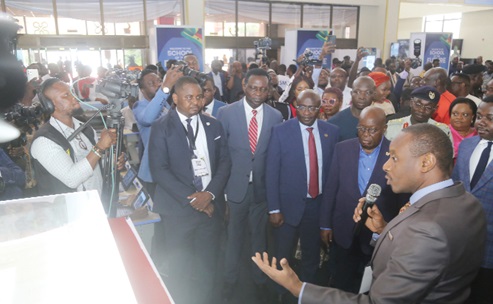
ICT in SHSs deepens: President launches Smart Schools Project: 1.3 Million tablets to schools - 100 Smart schools to be built
President Nana Addo Dankwa Akufo-Addo yesterday launched the Ghana Smart Schools Project, which includes the distribution of 1.3 million educational tablets to senior high school (SHS) students.
The project, which seeks to deepen the application of information technology (IT) in teaching and learning at the second cycle level, also involves the construction of 100 Smart Schools across the country, 30 of which will be completed by the end of this year.
Each tablet is fitted with digital content to aid research, teaching and learning.
At the tertiary level, the government plans to provide at a discounted price, tablets and laptops to students and lecturers to facilitate academic work.
Launch
At the project launch, President Akufo-Addo said although largely successful, the government continued to seek innovative ways to further improve on the Free SHS Policy.
He explained that the project would ultimately enhance the performance of students and prepare them better for higher learning and competitive careers in future.
He explained that the government was convinced that the next phase of Free SHS enhancement would be propelled by digitalisation.
“This will allow a seamless online and offline teaching and learning experience. Indeed, the enhanced Free SHSs will be environmentally friendly, boost academic performance fitted with interactive displays, interactive learning and increase productivity”.
Ghana Smart Schools Project
Touching on the other components of the Ghana Smart Schools Project, which is the provision of 100 modernised infrastructure, he said the remaining 70 schools were expected to be completed in the next two years.
President Akufo-Addo said the plan was that the 100 Smart Schools would be located in the cities in all 16 regions.
Features
These smart school buildings, he said, would be fitted with solar panels “as we the government seek to promote new and environmentally sustainable energy, meaning that the schools would be off the national electricity grid.”
“The President said the schools would also have digitalised infrastructure to advance teaching and learning and that the physical infrastructure took cognisance of the country’s unique climatic conditions, and would create a conducive atmosphere for learning.
“The schools will represent a new urban landmark for urban rural land use and planning. There will be modern iconic facilities, depicting the collective resolve of people for transformative and futuristic education,” he added.
SDGs
President Akufo-Addo said the project was in fulfilment of the education for sustainable development agenda, a key element in the 2030 Agenda for Sustainable Development Goal number four, which prioritises quality education, a key driver for the attainment of all 17 SDGs.
“It will provide the needed infrastructure to facilitate e-learning and digitalisation to boost high school education in the country.
And as a well thought out arrangement, a student will be provided with an electronic tablet on which are comprehensive teaching and learning management systems and digital learning contents to facilitate research, teaching and learning,” he explained.
Highest enrolment
On Free SHS enrolment, President Akufo-Addo noted that from the initial annual enrolment of 422, 940, some 503,000 children entered SHS this year, the highest ever enrolment of children into SHS in a single year in the country’s history.
He added that 5.10 million children had so far benefited from the Free SHS Policy since it was instituted in September 2017.
He said this had consumed a considerable budgetary allocation of some GH¢ 12.8 billion, amply demonstrating the sheer determination by the Akufo-Addo government to ensure that education became a catalyst around which the future transformation of the nation would revolve.
“I am particularly proud of how in the midst of the COVID-19 pandemic and other dire economic constraints, we have been able to sustain the free senior high school programme and advanced it even further with additional TVET without compromising the needs of the lower level of our education system,” President Akufo-Addo noted.
Minister
The Minister of Education, Dr Yaw Osei Adutwum, said under the Free SHS programme, the government had produced some impressive outcomes and results from the West African Senior School Certificate Examination (WASSCE).
Currently, he said, Ghanaian SHS graduates were studying in some of the prestigious universities in Ghana and other parts of the world, with some of them emerging tops at the WASSCE level, adding that “this is the legacy of the Akufo-Addo-led government”.
He said across the country, the government had enhanced the state of infrastructure on various campuses and provided more textbooks, other teaching and learning materials and taken steps to enrich the curriculum “as we chart a new pathway to future high school education”.
“We provided computers to schools and provided free WiFi to propel their utilisation. We worked with the teachers through their unions to procure laptops for them to aid their work.
We have also boosted the reward system with an enhanced Best Teacher Award scheme.
“This government will ensure that the education sector continues to receive the best investment,” he added.
Dr Adutwum said time was ticking for Ghana and the rest of the world to achieve the target set in the Sustainable Development Goals and for those in the education arena, they had only the next six years to "ensure inclusive and equitable quality education and promote lifelong learning opportunities for all.”
